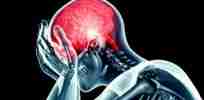Jon Hamilton
Articles written for the GLP list the source as Genes and Science. All other articles were written for the sources noted with excerpts provided by the GLP.
Podcast: Gene therapy could be best hope to cure Duchenne muscular dystrophy
Conner Curran was 4 when he was diagnosed with Duchenne muscular dystrophy. His muscles were already beginning to waste away ...
Brain wave patterns could eliminate ‘trial and error’ approach to antidepressants
Scientists have taken a small step toward personalizing treatment for depression. A study of more than 300 people with major ...

Irregularity in the brain’s ‘insulation’ may offer way to ‘prevent or even reverse’ autism symptoms
Scientists have found a clue to how autism spectrum disorder disrupts the brain's information highways. The problem involves cells that ...
Using ‘mini brains’ to study Parkinson’s, Alzheimer’s and other disorders hits a potential snag
Brain organoids, often called "minibrains," have changed the way scientists study human brain development and disorders like autism. But the ...

Ouch! Here’s how your brain deals with pain and the emotion that follows
“At its core, pain is just something that hurts or makes you say ouch," says Karen Davis, a senior scientist at ...

Short days, dark moods: Can a brain short circuit explain SAD (seasonal affective disorder)?
Just in time for the winter solstice, scientists may have figured out how short days can lead to dark moods ...
Podcast: How deep brain stimulation relieves depression symptoms
There's new evidence that mild pulses of electricity can relieve depression — if they reach the right target in the ...
Podcast: What does sadness look like in the brain?
Scientists may have caught a glimpse of what sadness looks like in the brain. A study of 21 people found ...
Podcast: Exactly how does the brain do something as simple as storing a phone number?
You hear a new colleague's name. You get directions to the airport. You glance at a phone number you're about ...
Newly discovered brain cells could be key to human uniqueness
Scientists have taken another step toward understanding what makes the human brain unique. An international team has identified a kind ...
Metamemory and Alzheimer’s: How humans (and rats) monitor their own thoughts
Rats have shown that they have the ability to monitor the strength of their own memories, researchers from Providence College reported...in ...
Brain cell transplants to treat Parkinson’s disease may return after 14-year ban
Researchers are working to revive a radical treatment for Parkinson's disease. The treatment involves transplanting healthy brain cells to replace ...
Natural chefs? Chimps learn to use an oven, sparking debate on how humans learned to cook
If you give a chimp an oven, he or she will learn to cook. That's what scientists concluded from a ...
Pinhead-sized ‘minibrains’ could revolutionize drug discovery for diseases from Zika to Alzheimer’s
Known as "minibrains," these rudimentary networks of cells are small enough to fit on the head of a pin, but ...
Can Lumosity, other ‘brain games’ improve cognition? Exhaustive evaluation says no
Want to be smarter?...If so, don't count on brain games to help you. That's the conclusion of an exhaustive evaluation ...
Future of Alzheimer’s detection: Smelling coffee, fruits or smoke
Two studies released at an international Alzheimer's meeting [July 26] suggest doctors may eventually be able to screen people for this ...
How did our genes make humans so smart?
The GLP aggregated and excerpted this blog/article to reflect the diversity of news, opinion and analysis. Patterns of gene expression ...
Women hit harder than men by Alzheimer’s and memory loss
There's new evidence suggesting that women's brains are especially vulnerable to Alzheimer's disease and other problems with memory and thinking ...
What’s your brain doing while you sleep?
There's new evidence that the brain's activity during sleep isn't random. And the findings could help explain why the brain ...
Gene therapy cure for colorblindness may be on its way
More than 10 million Americans have trouble distinguishing red from green or blue from yellow, and there's no treatment for ...
Autism, schizophrenia may have similar origins in brain
A new understanding of the brain's cerebellum could lead to new treatments for people with problems caused by some strokes, ...
Taking the sting out of California superbug outbreak
News reports are describing a "nightmare superbug" killing people in California. But scientists who study infectious diseases say the risk ...
Did early humans have innate ability to make speechlike vocalizations?
An orangutan named Tilda is providing scientists with fresh evidence that even early human ancestors had the ability to make ...
New direction for Alzheimer’s research, with hope of finding cure
After years of setbacks, Alzheimer's researchers are sounding optimistic again. The reason: a brain protein called tau. At this year's ...
New research challenges oxytocin’s connection to autism
Scratch one more simple explanation for autism off the list. This time it's the idea that children with autism have ...
Like digital cameras, brain ‘geotags’ new memories
New research suggests that the human brain saves certain information, such as location, in order to help new memories form, ...
How a pregnant woman’s choices could shape a child’s health through epigenetics
Researchers are trying to understand how a pregnant mother's actions affect the developing fetus in childhood and beyond through epigenetics ...
Gene affects how tough situations influence parenting
A gene that affects the brain's dopamine system appears to have influenced mothers' behavior during a recent economic downturn, researchers ...

